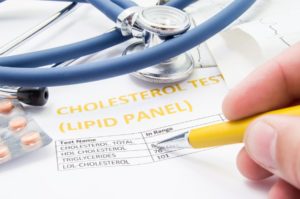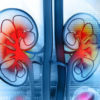The body naturally produces all the cholesterol it needs to help with various functions. However, because cholesterol is also found in common foods, and other factors may elevate total levels, many people are at risk of having too much cholesterol in their system. At Bergen Medical Associates, a Patient-Centered Medical Home (PCMH) in northern New Jersey, board-certified practitioners diagnose and treat high cholesterol and other conditions.
High Cholesterol
High Cholesterol Diagnosis and Treatment in Northern New Jersey
What Is Cholesterol?
 Found in every cell in the body, cholesterol is a fat-like, waxy substance. It plays a role in creating hormones, vitamin D, and substances that aid with digestion. When the blood contains too much cholesterol, it can combine with other substances and form plaque, which sticks to artery walls. Atherosclerosis, the buildup of plaque, can lead to coronary artery disease, which makes arteries narrow or blocked.
Found in every cell in the body, cholesterol is a fat-like, waxy substance. It plays a role in creating hormones, vitamin D, and substances that aid with digestion. When the blood contains too much cholesterol, it can combine with other substances and form plaque, which sticks to artery walls. Atherosclerosis, the buildup of plaque, can lead to coronary artery disease, which makes arteries narrow or blocked.
What Problems Are Associated With High Cholesterol?
High cholesterol levels can result in a variety of health issues. For example, if a patient has large deposits of plaque in their arteries, a rupture can occur, causing blood clots to form on the plaque’s surface. Large blood clots are extremely dangerous, as they can block blood flow in coronary arteries. If the heart is not receiving enough oxygen-rich blood, angina (chest pain) or a heart attack can occur.
Plaque doesn’t affect only the heart, though. It also can accumulate in other arteries throughout the body, including those responsible for supplying the limbs and brain with oxygen-rich blood. In these cases, stroke, peripheral arterial disease, and carotid artery disease may develop.
What Are HDL, LDL, and VLDL?
Lipoproteins are a combination of lipid (fat) and protein. In other words, the lipids must be attached to the proteins so they can travel throughout the bloodstream. There are three main types of lipoproteins, including:
- High-density lipoprotein (HDL): Also known as good cholesterol, HDL carries cholesterol from throughout the body to the liver, which expels it from the system.
- Low-density lipoprotein (LDL): Also known as bad cholesterol, high levels of LDL lead to plaque buildup in the arteries. LDL carries cholesterol throughout the body.
- Very-low-density lipoprotein (VLDL): This is another type of bad cholesterol, as too much VLDL leads to plaque buildup in the arteries. VLDL carries triglycerides, a type of fat in the blood, throughout the body.
What Are the Causes and Risk Factors for High Cholesterol?
An unhealthy lifestyle is the leading cause of high cholesterol, followed by genetics. Certain medical conditions and medications also can increase cholesterol levels. It’s important to discuss individual risk with a primary care physician, but generally, the main risk factors of high cholesterol include:
- Poor diet and nutrition: Eating foods rich in bad fats, such as saturated and trans fats, can raise LDL cholesterol levels. These may include dairy products, deep-fried foods, processed foods, chocolate, and baked goods.
- Little to no exercise: High cholesterol risk increases in those who do not exercise regularly.
- Sedentary lifestyle: Too much sitting can elevate high cholesterol levels.
- Smoking: Smoking lowers HDL cholesterol and raises LDL cholesterol, especially in women.
- Age: Risk heightens with age, though people of any age can have high cholesterol.
- Heredity: Familial hypercholesterolemia (FH) is a form of high cholesterol that is inherited.
- Weight: Those who are overweight or obese are at increased risk.
- Race: Black people tend to have higher LDL and HDL levels than Caucasians. Other races might also be at elevated risk.
What Are Signs of High Cholesterol?
There are no obvious symptoms of high cholesterol. The condition often can go undiagnosed until the medical complications become severe, making it imperative that patients have their cholesterol regularly checked. However, there are some signs that internal medicine physicians recognize, which could be associated with high cholesterol:
- Chest pain, fullness, or pressure on the left side
- Dizziness
- Lower leg pain
- Slurred speech
- Unstable gait
If these signs are noticed, immediate medical attention is highly recommended. They may be signs of high cholesterol or serious consequences such as stroke, heart disease, or atherosclerosis.
How Is High Cholesterol Diagnosed?
Routine blood tests measure cholesterol levels, including HDL, LDL, and VLDL counts. Patients should receive these diagnostic tests on a frequency based on individual risk. General recommendations for high cholesterol screening include:
Ages 19 and Younger
- For children at normal risk, the first cholesterol test should take place between ages nine and 11.
- For children with higher risk (i.e., family history of high cholesterol, stroke, or heart attack), testing should start at age two.
- Regardless of the age when testing starts, cholesterol screenings should occur every five years.
Ages 20 and Older
- Testing beginning in childhood should continue every five years.
- For men, screenings should occur every one to two years if between ages 45 and 65.
- For women, screenings should occur every one to two years if between ages 55 and 65.
What Are Treatment Options for High Cholesterol?
Bergen Medical Associates formulates personalized treatment plans for patients with high cholesterol, taking their unique risk factors, blood test results, and overall health into account. The main treatment options for high cholesterol include:
Heart-Healthy Lifestyle Changes
Maintaining a healthy weight, getting routine physical activity, and eating nutritious, low-cholesterol foods can improve the condition. Patients may be encouraged to meet with a dietician or nutritionist to help them implement an optimal meal plan, as well as a personal trainer to safely begin an exercise regimen.
Medication
For some, lifestyle changes may not be enough to lower their cholesterol. Several types of medications are available to treat high cholesterol, and internists will prescribe the best option for each patient depending on personal risk factors. The types of medications include:
- Bile-acid-binding resins: Cholesterol is needed by the liver to produce bile acids, which are required for digestion. These medications bind to bile acids, forcing the liver to use excess cholesterol to produce more bile acids.
- Cholesterol absorption inhibitors: Because the small intestine absorbs cholesterol from food and releases it into the bloodstream, this drug limits the absorption of dietary cholesterol.
- PCSK9 inhibitors: This option assists the liver in absorbing more LDL cholesterol, thus decreasing the amount of bad cholesterol in the blood.
- Statins: These drugs block a substance needed by the liver to create cholesterol.
Patients with high triglycerides may be prescribed different medications, such as:
- Fibrates: VLDL cholesterol production is decreased in the liver.
- Omega-3 fatty acid supplements: These can help lower triglycerides and can be prescribed or purchased over the counter. A physician should determine whether it’s safe for a patient to take these supplements, as they can cause adverse reactions when taken with other medications.
Lipoprotein Apheresis
This procedure might be used in cases of FH. A filtering machine is used to remove LDL cholesterol from the blood, and then return the blood to the bloodstream.
Frequently Asked Questions About High Cholesterol
Cholesterol can be difficult to understand, but Bergen Medical Associates is committed to providing education to patients about the conditions they are experiencing. Here are some frequently asked questions:
Is High Cholesterol Life-Threatening?
Untreated high cholesterol can result in several life-threatening conditions, including heart attack, peripheral vascular disease, stroke, high blood pressure, and kidney disease. This is because bad cholesterol can lead to the formation of plaque, which blocks arteries and prevents blood from flowing as it should.
What Foods Can Help Decrease High Cholesterol Risk?
Prioritize the consumption of lower-cholesterol foods, including:
- Apples
- Barley
- Eggplant
- Fatty fish
- Fiber supplements
- Grapes
- Nuts
- Oats
- Okra
- Soy
- Strawberries
- Sterols and stanols
- Vegetable oils
- Whole grains
How Long Can It Take to Lower Cholesterol?
After implementing a healthier diet and more exercise, it can take anywhere from three to six months to see desired results. This timeline will vary greatly by patient depending on individualized risk factors and whether high cholesterol medications are required.
Can High Cholesterol Be Prevented?
For those with genetic risk factors, high cholesterol is not completely preventable. However, those at average risk can keep their cholesterol levels in balance by practicing healthy lifestyle choices, thus lowering the risk of complications such as stroke and heart disease.
Combat High Cholesterol With Bergen Medical Associates
If cholesterol is a concern, turn to the physicians at Bergen Medical Associates who have a wide range of specialties with expertise and a proven track record of success. Patients across northern New Jersey can rely on state-of-the-art care for high cholesterol and many other medical conditions. To learn more about high cholesterol treatment or make an appointment, contact one of the Bergen Medical Associates locations today.










